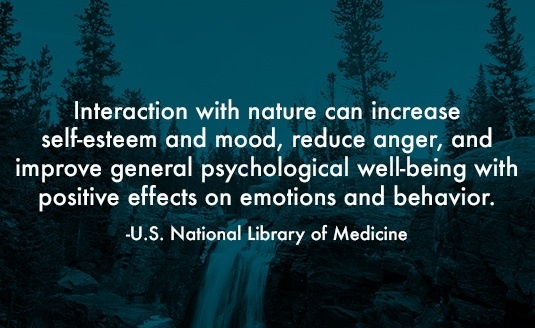What is Adventure Therapy?
Adventure therapy is a form of experiential therapy that utilizes challenging adventure activities to aid in the therapeutic healing process.
For a long time, nature has been seen as a balm to the problems we face in society. Even during pre-industrial times, people would seek out the countryside as a means to feel better. Many people have also used nature as a way to understand the world around them. Albert Einstein said, “Look deep into nature, and then you will understand everything better.” Adventure-based outdoor therapy is a form of therapy that aims to help individuals in recovery by gaining new life skills. This should enable them to better deal with everyday challenges in life and have a better chance at maintaining sobriety. Adding the adventure component to outdoor therapy helps individuals push themselves, reconnect with nature, and accomplish new goals. There are various options for adventure therapy that range in difficulty and can be adjusted depending on the ability of each individual.

Adventure Therapy and Mental Health
Mental health is often a significant factor in many people’s journey with addiction. Its possible people will experience mental health disorders before or because of addiction. Any mental health problems may also further deteriorate as a result of addiction. Even without a severe mental illness, it’s likely that most people struggling with substance abuse and addiction will need to work on improving their mental health. For many people in nature, feel calm and at peace. Adventure therapy is a great way to improve mental health and strengthening mental health is essential in recovery. In an article published by the U.S. National Library of Medicine, the authors cited studies finding, “Interaction with nature can increase self-esteem and mood, reduce anger, and improve general psychological well-being with positive effects on emotions and behavior.”
A lot of people find nature to be therapeutic. It provides an escape from the daily stresses we deal with in real life, many of which feel worsened by modern features – loud noises in towns and cities, technology, and work among many other possibilities.
Why Adventure Therapy?
Sometimes talk therapy is not possible for individuals or they have difficulty opening up about certain topics. Nature allows time to get away and reflect internally. Wallace Nichols, a marine biologist, said“…the mere sight and sound of water can induce a flood of neurochemicals that promote wellness, increase blood flow to the brain and heart and induce relaxation.” Adventure therapy can involve activities like kayaking, white water rafting, or swimming, but it can also involve simple activities like walking by the water. Improving your mental health, by any means, helps improve your physical health. Doing so with adventure therapy helps create a positive cycle of improving mental and physical health.
MountainView Recovery
5475 Mark Dabling Blvd #102
Colorado Springs, Co 80918
Contact Us Today!
MountainView Resources!
Adventure Therapy and Physical Health
Both physical and mental health are strongly linked together. Physical health is not always the stereotypical image of a “fit person”. It varies for everyone and that is absolutely fine. What is important for any person, however, is to take care of their physical health through the resources they do have. Even something as simple as walking on flat terrain is still good for people. Multiple studies have found that minimal exercise like 15 minutes a day still significantly helps.
Adventure therapy allows individuals to continually improve their physical health and reach new goals as time goes on. Accomplishing something new helps provide a sense of purpose. Adventure therapy can be done alone or in groups; both settings allow for individuals to reflect internally if they aren’t ready or able to open up about certain issues. The group aspect allows for individuals to strengthen communal ties, which are essential in recovery. Support is integral in the beginning, but even long after someone leaves treatment. The bonds that they build in activities like adventure therapy could be life-long.

Using Adventure Therapy in Treatment
Adventure Therapy is a great way to help in recovery. It provides an outlet for individuals to work through issues, individually or in a group, challenge themselves, and a way for them to develop new interests and skills to put their energy into. Addiction impacts mental and physical health, ranging in severity depending on the substance and length of use. For most people they will find that they need to work on both in recovery, wherever each is at. A number of people use substances to cope with mental health issues in the first place. Adventure therapy might be a way for people to finally start working on improving their mental health. Other forms of therapy, including talk therapy, will still be necessary, but adventure therapy is a great option for a lot of individuals. Mountain View Recovery strongly believes in utilizing adventure therapy to help individuals recover. In Colorado, we have incredible opportunities to engage in this, which we do so through hiking and bouldering. To find out more about how adventure therapy helps in recovery, contact us today.
Mountain View Recovery Treatment Programs
Patient Resources
Addiction is complex, which means treatment and long-term recovery are complex. Despite this, it shouldn’t scare anyone – patients or their loved ones. It just means that treatment and recovery both require thorough and thoughtful planning.
Outpatient Program
Our outpatient program (OP) is a transition preparatory phase. It provides a minimum of nine (9) hours of weekly outpatient treatment. This involves a minimum of one (1) hour/s individual substance abuse/behavioral health counseling per week.
Adventure Therapy
For a long time, nature has been seen as a balm to the problems we face in society. Even during pre-industrial times, people would seek out the countryside as a means to feel better. Many people have also used nature as a way to understand the world.
Trauma and Recovery
Just like physical trauma occurs, so does psychological trauma. Any number of traumatizing events occur and cause psychological trauma. A lot of people will experience trauma before or because of addiction. It’s possible for addiction to deepen…
Neurofeedback
Nobody sets out with the intention of becoming addicted to anything. Even someone making a conscious decision to try substances is not intending to become dependent, experience withdrawal, and risk overdose or death. There are numerous factors.
